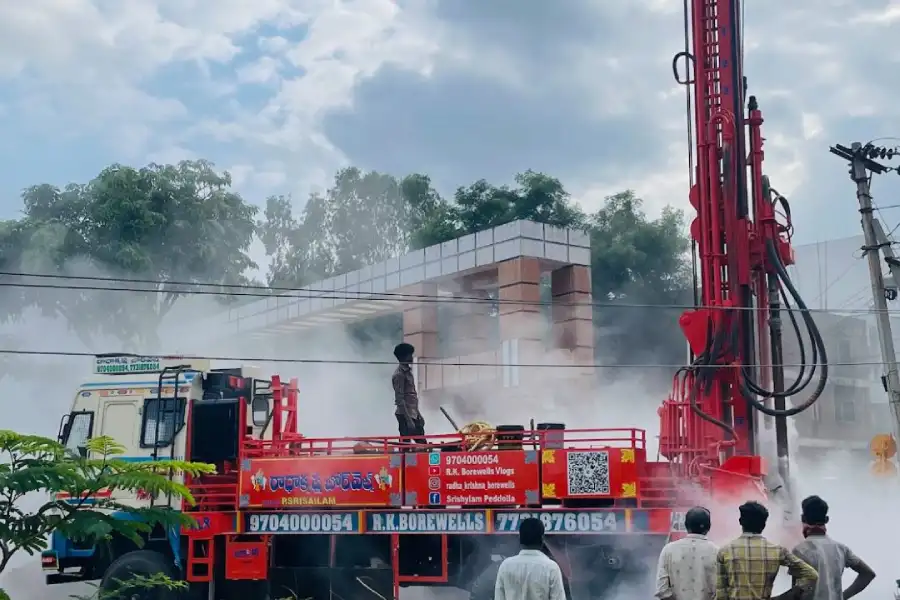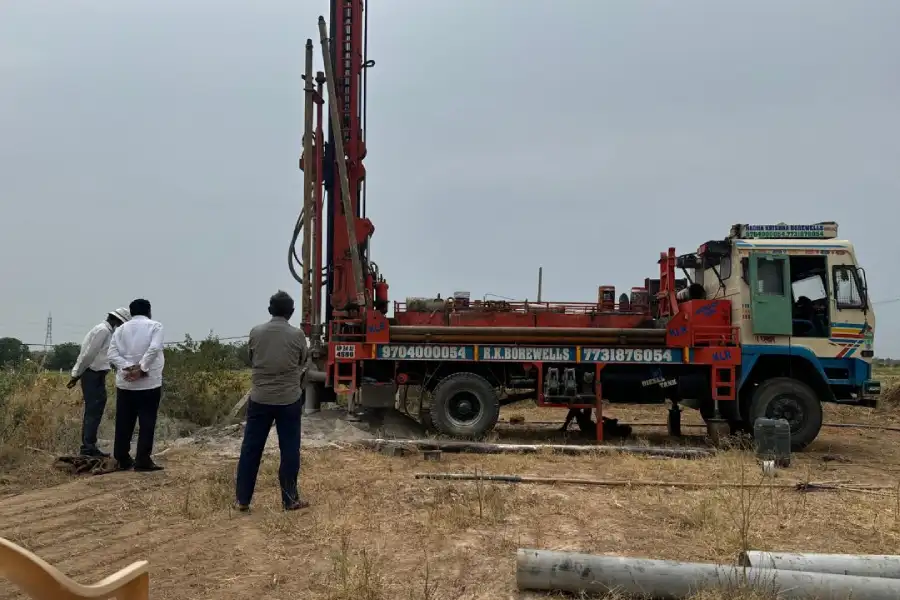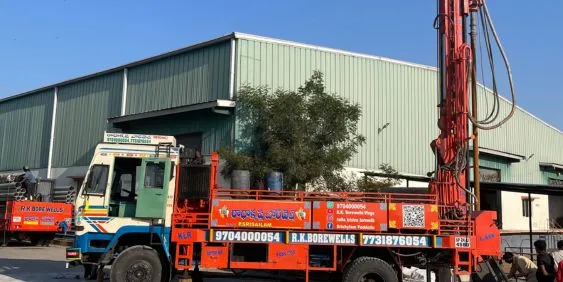Copyright © 2024 RADHA KRISHNA BOREWELLS, All rights reserved. Design by FareWorks
At Radha Krishna Borewells, we specialize in the professional repair of collapsed borewells in Hyderabad and across Telangana, providing reliable water solutions to restore your borewell’s functionality. With over 30 years of expertise, we understand the critical need for quick and efficient repairs to collapsed borewells, which can significantly impact your water supply. Our skilled team uses advanced equipment to identify and fix any issues, ensuring that your collapsed borewell is fully restored, whether for residential, commercial, or agricultural use. We are known for delivering cost-effective borewell repair services that are tailored to the specific needs of your property, helping you regain uninterrupted access to clean water. Trust Radha Krishna Borewells for all your borewell repair and maintenance needs in Hyderabad and Telangana, and ensure your water supply is always flowing efficiently.



Our commitment to quality and efficiency guarantees that each borewell repair is carried out with precision, restoring a continuous and reliable water supply. At Radha Krishna Borewells, we offer customized and affordable borewell repair services, ensuring your satisfaction no matter the size or complexity of the collapsed borewell issue.
Borewell collapse can occur due to various factors, including shifting soil, poor quality casing installation, and the depletion of groundwater levels. Over time, these issues can lead to borewell walls caving in, causing blockages and reduced water flow. Regular borewell maintenance can help prevent such collapses, but in cases where a collapse has already occurred, prompt borewell repair is essential to avoid further damage
Shifting Soil:
Poor Quality Casing Installation:
Depletion of Groundwater Levels:
Improper Borewell Construction:
Aging and Lack of Maintenance:
Reduced Water Availability: A collapsed borewell results in limited water access, which can be particularly problematic in areas that rely heavily on borewells as the primary source of water for drinking, agriculture, or industrial use.
High Repair Costs: Borewell collapse not only impacts water access but also leads to significant repair expenses. Repairing a collapsed borewell requires complex procedures such as re-drilling, re-casing, or removing blockages, all of which are expensive and time-consuming.
Environmental Concerns: If contaminated soil or surface water enters a collapsed borewell, it can compromise the aquifer that feeds the borewell, leading to broader water contamination issues in the region. Contaminated aquifers can affect neighboring wells and the wider ecosystem.
Permanent Damage: In extreme cases, a borewell collapse may cause irreparable damage, making it impossible to restore the well. In such cases, a new borewell might need to be drilled, adding to the cost and effort.
At Radha Krishna Borewells, we utilize a systematic approach to repair collapsed borewells and restore optimal water flow. Here’s an elaboration of each step in the process:
Objective: To thoroughly inspect the borewell and understand the cause and extent of the collapse.
Process:
Our expert team conducts an in-depth inspection of the collapsed borewell, using advanced tools such as borewell cameras, sensors, and other diagnostic equipment. This step is crucial to determine the nature of the collapse, whether it is caused by shifting soil, casing failure, debris accumulation, or groundwater depletion. The assessment helps identify the exact location and severity of the problem, allowing us to design the most suitable repair strategy.
Outcome: A clear understanding of the underlying issues affecting the borewell, enabling precise planning for cleaning, repairs, and reinforcement.
Objective: To remove all blockages and clear the borewell shaft of debris, silt, and sand.
Process:
Once the assessment is complete, we proceed with the cleaning and flushing of the borewell. Using high-pressure water jets, we flush out accumulated silt, sand, soil, and any other debris that may have entered the borewell as a result of the collapse. In some cases, air compression or mechanical cleaning tools may also be used to ensure the borehole is entirely clear of blockages.
Why It’s Important: This step is critical because the buildup of debris or sand not only blocks water flow but can also further destabilize the borewell walls. Flushing ensures a clean borewell shaft, providing better conditions for structural repair and improving water flow.
Objective: To restore the structural integrity of the borewell by addressing damaged or failed casing.
Process:
During the inspection, we check the condition of the borewell casing—the pipe that lines the inside of the borehole and prevents it from caving in. If the casing is found to be cracked, corroded, or collapsed, it must be repaired or replaced. We use high-quality casing materials such as PVC or steel, depending on the specific requirements of the borewell. The new or repaired casing is carefully installed to ensure that it covers the entire vulnerable section of the borewell, providing robust support and preventing further collapses.
Why It’s Critical: The casing serves as the main support structure for the borewell walls. A weak or damaged casing is a primary cause of borewell collapse, so ensuring that it is properly repaired is essential to long-term stability.
Objective: To strengthen the borewell structure and prevent future collapses.
Process:
After cleaning and casing repair, we take steps to reinforce the borehole itself. This may involve using grouting techniques where a cement-based mixture or other advanced materials are injected around the casing to fill any voids and strengthen the surrounding soil. In some cases, reinforcement rings or liners may be used to provide additional support to weakened areas of the borehole.
Why It’s Effective: By reinforcing the borehole walls, we ensure that the well is more resistant to future collapses caused by shifting soil or groundwater level fluctuations. This helps extend the life of the borewell, ensuring reliable and stable operation over time.
Objective: To confirm that the borewell is fully operational and capable of delivering an adequate water supply.
Process:
After completing all repairs, we conduct a final water flow test. This involves using pumps to measure the yield and flow rate of water extracted from the borewell under different pressures. The test ensures that the borewell is functioning optimally and that the water flow has been restored to its previous levels or improved.
Outcome: If the water flow and yield meet the required standards, we can confidently conclude that the borewell has been fully restored to efficient working condition. Any discrepancies found during the test will be addressed through further adjustments or cleaning if needed.
At Radha Krishna Borewells, we follow this systematic approach to ensure collapsed borewells are not only repaired but also reinforced for long-term stability and performance. By addressing the root causes of collapse and restoring structural integrity, we ensure that the borewell continues to deliver a consistent water supply for years to come.
When it comes to choosing a company for borewell drilling in Hyderabad or Telangana, Radha Krishna Borewells stands out for several reasons. Here’s why customers trust us with their borewell drilling projects:

Over 30 years drilling expertise in challenging geological conditions.
Latest drilling tech for precise, deep borewell drilling in any terrain.
Competitive pricing for borewell drilling, repair, and maintenance services.
Quick borewell drilling with minimal disruption, completed in days.
Hear from our satisfied clients across Hyderabad and Telangana who have trusted us with their Repairing Collapsed Bores needs.
Here are answers to some of the most frequently asked questions about Repairing Collapsed Bores, maintenance, and repair services. If you have any other questions, feel free to reach out to us.
Q1: What are the common signs that a borewell is collapsing?
A1: Signs include reduced water flow, muddy water, unusual noises, or sudden loss of water supply.
Q2: Can a partially collapsed borewell still be repaired?
A2: Yes, a partially collapsed borewell can often be repaired with casing replacement or reinforcement before the damage worsens.
Q3: What techniques are used to repair a collapsed borewell?
A3: Common techniques include debris removal, flushing, casing repair or replacement, and reinforcing the borewell walls.
Q4: How can I prevent my borewell from collapsing in the future?
A4: Regular maintenance, proper casing installation, and periodic flushing can help prevent borewell collapses.
Q5: What happens if the borewell collapses completely?
A5: A complete collapse may require extensive repairs or, in some cases, the drilling of a new borewell.
Q6: Does borewell repair affect the water quality?
A6: Repairing a collapsed borewell can improve water quality by removing debris and restoring proper flow.
Q7: Can borewell collapse occur suddenly, or is it a gradual process?
A7: Borewell collapse can happen gradually due to factors like soil erosion, but sudden collapses can also occur due to shifts in the ground.
Q8: What equipment is used in repairing a collapsed borewell?
A8: Equipment such as drilling rigs, high-pressure water flushing machines, and specialized casing tools are used in borewell repairs.
Q9: Is it safe to use the borewell during the repair process?
A9: No, the borewell should not be used during repairs to avoid further damage and ensure safety.
Q10: How do I know if my borewell needs repair or replacement?
A10: A professional inspection will determine whether the borewell can be repaired or if drilling a new borewell is necessary.
Are you looking for reliable Earthing Holes services in Hyderabad or Telangana? Contact Radha Krishna Borewells today for a free consultation and site survey. Our team is ready to help you access a reliable water source with our professional drilling, repair, and maintenance services.

Providing expert borewell drilling, repair, and maintenance services across Hyderabad with over 30 years of trusted experience.
